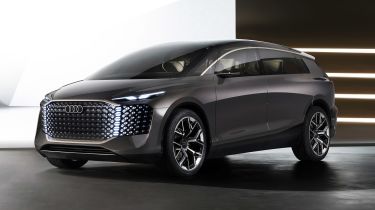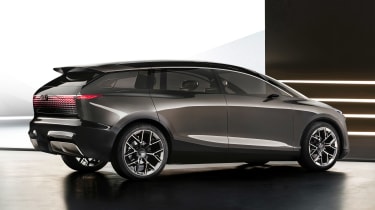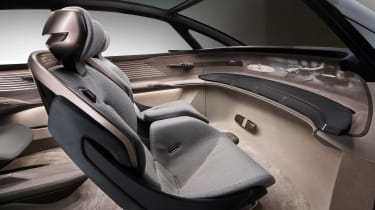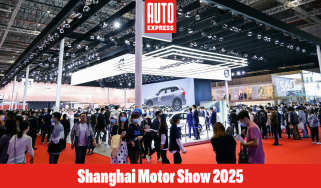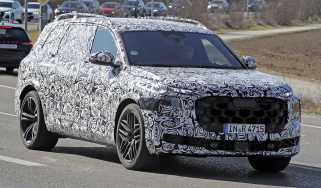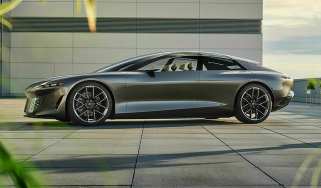New Audi Urbansphere concept revealed as an MPV for megacities
The Audi Urbansphere concept follows the Skysphere and Grandsphere with a focus on space, tech and autonomous driving for a city setting
Completing its trio of ‘sphere’ concepts, Audi has unveiled the Urbansphere – a high-tech MPV-like all-electric machine that puts the focus on interior space and autonomous driving.
Although there’s no intention to put the Urbansphere concept into production for now, it’s been designed for the Chinese market primarily, highlighting a future of mobility in megacities, such as Shanghai.
The Urbansphere follows Audi’s Skysphere open-top sports car concept and Grandsphere luxury GT that previews the brand’s next-generation A8. The Urbansphere shares elements of those cars’ styling too, with a fully blanked-off ‘singleframe’ grille flanked by a pair of slim headlights that suggest how Audi’s of the future could look like.
At the rear a matrix of LED lights – including Audi’s illuminated four-ring emblem – act as a communication element along with the front grille, with different animations and illumination patterns possible to communicate with other road users and improve safety. A critical point given the car’s intended use in busy cities.
It also shares the Gransphere’s split window glass arrangement on the A-pillar and roof rails in an attempt to hide its visual mass and make the car look sleeker. That’s because, riding on 24-inch wheels, the Urbansphere is also much taller than Audi’s other ‘sphere’ concepts – and much longer too. At 5.51 metres long it’s the largest concept Audi has ever produced and has been designed from the inside out around the passenger experience.
The car’s 3.4-metre wheelbase and 2.01-metre-wide body has helped maximise space inside, with the two individual rear seats offering plenty of space and comfort. The result of this focus on space resulted in a natural MPV-like shape, Audi claims, rather than being designed with this silhouette and proportions in the first place. Counter-hinged doors and the lack of B pillars also help entry and exit and promote a feeling of space, the brand claims.
The Urbansphere’s rear chairs recline individually by up to 60 degrees, while leg rests extend from the rear seat bases for extra comfort. The pair of rear seats can swivel inboard to face each other in a more social set-up while the headrests can also be manoeuvred to provide more privacy if needed, as per the set-up in a business class pod aboard and airliner.
Stress detection tech uses facial scans and voice analysis to figure out how passengers are feeling and suggests the best ways for them to relax, according to Audi. Individual monitors are mounted on the front seatbacks to cater for rear-seat passengers’ independent entertainment needs as a result.
However, if the two occupants want to watch the same thing or take part in the same video conference, a large-format OLED screen folds down from the headlining. There is also a split-screen setting for this piece of tech. Other shared functions include a water dispenser in the rear centre console.
In the front, digital readouts and screens are projected onto the Urbansphere’s wooden trim inlays, as per the Grandsphere concept, featuring a sensor bar underneath these projections that allows front-seat users to switch between functions.
Audi’s MMI Touchless response system also features on the car’s doors, consisting of a rotary control to flick through different menus. Users can operate this physically if the front seats are in the upright setting, while with eye tracking and gesture recognition it can be used to achieve the same result if the seats are reclined and slid back.
This is possible thanks to the Urbansphere’s Level 4 autonomous driving capability. At the touch of a button the car’s steering wheel will retract into the dashboard, freeing up more screen projection area on the dash for infotainment services.
In this mode the Urbansphere can even pick up its passengers by driving itself, Audi claims, as well as finding a parking space or taking care of charging needs independently. This latter point implies that the Urbansphere’s battery charging is wireless and doesn’t need a physical connection.
The concept is based on Audi’s PPE platform for electric cars and is powered by a battery with “around 120kWh of energy” that delivers a claimed range of 466 miles. With 270kW charging capability thanks to the PPE platform’s 800v electronic architecture, a five to 80 per cent charge takes less than 25 minutes; 186 miles of range can be added in 10 minutes.
The battery feeds a pair of electric motors for quattro four-wheel drive, delivering a total of 396bhp and 690Nm of torque. However, no performance figures have been quoted; given the Urbansphere’s size and likely high weight due to this and the big battery, a respectable but not rapid 0-62mph time is likely. The car’s front motor can also be decoupled when not needed to improve efficiency and range.
Despite its size, the PPE platform’s rear-axle steering boosts the Urbansphere’s manoeuvrability and turning circle for use in tighter situations, while the multi-link front and rear axles are controlled by an adaptive air suspension set-up for comfort on the patchy asphalt you often find in towns and cities, according to Audi.
Just as the zero-emission powertrain places a focus on sustainability, Audi has also selected the interior materials carefully to back this up. The cabin features hornbeam wood veneers from sustainable sources, while the seat padding is made from a recycled polyamide and the upholstery from bamboo viscose fabric.
Click here for more on the Audi Grandsphere concept...
Find a car with the experts

